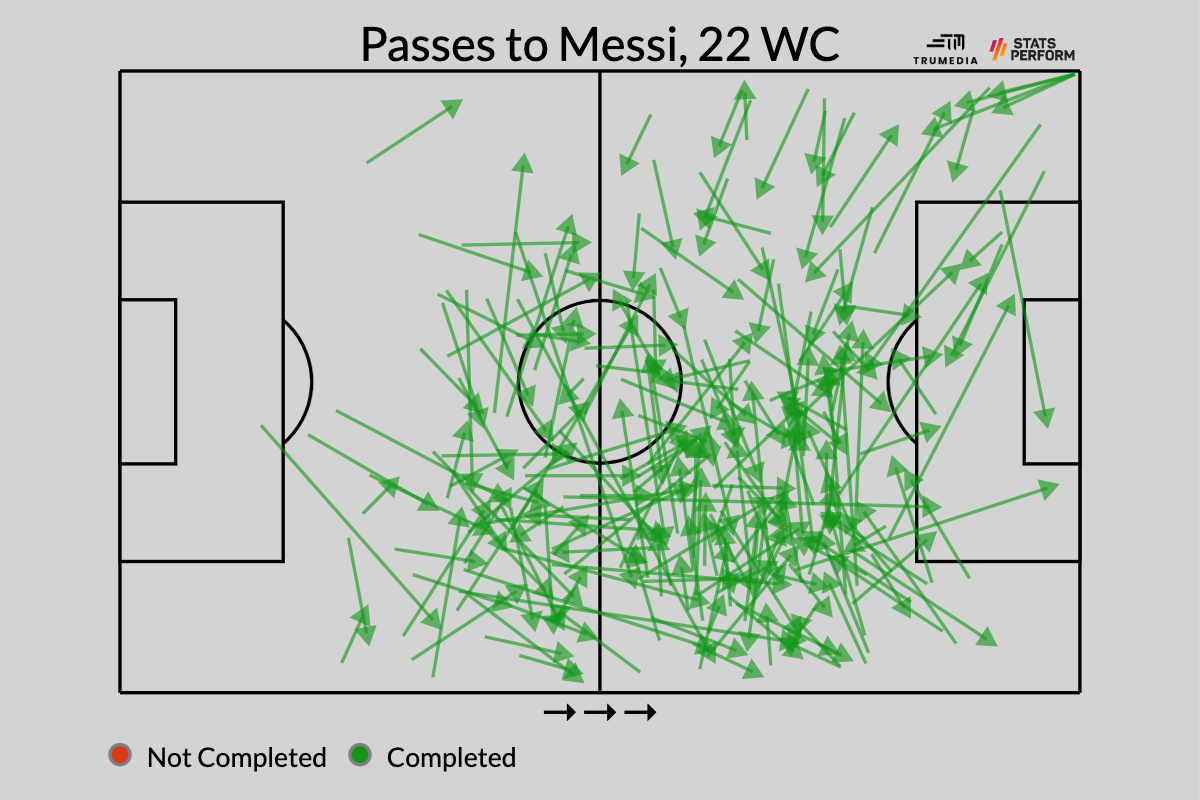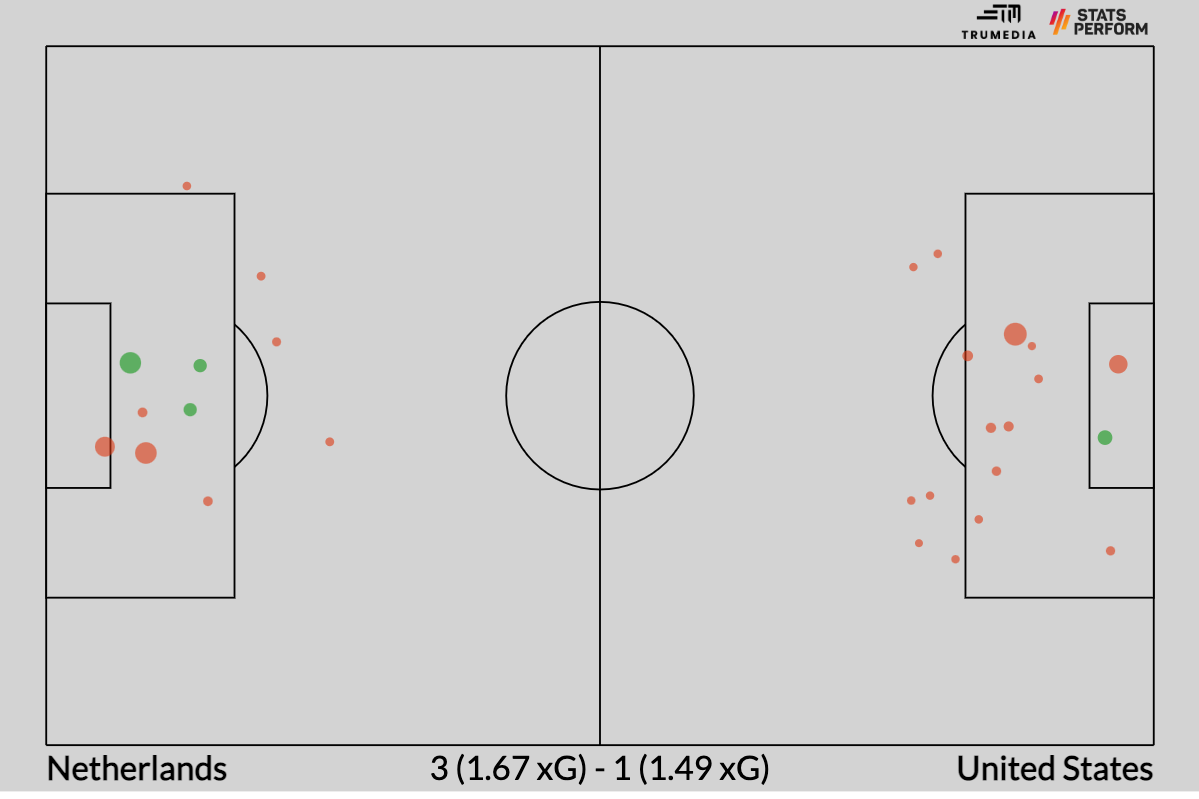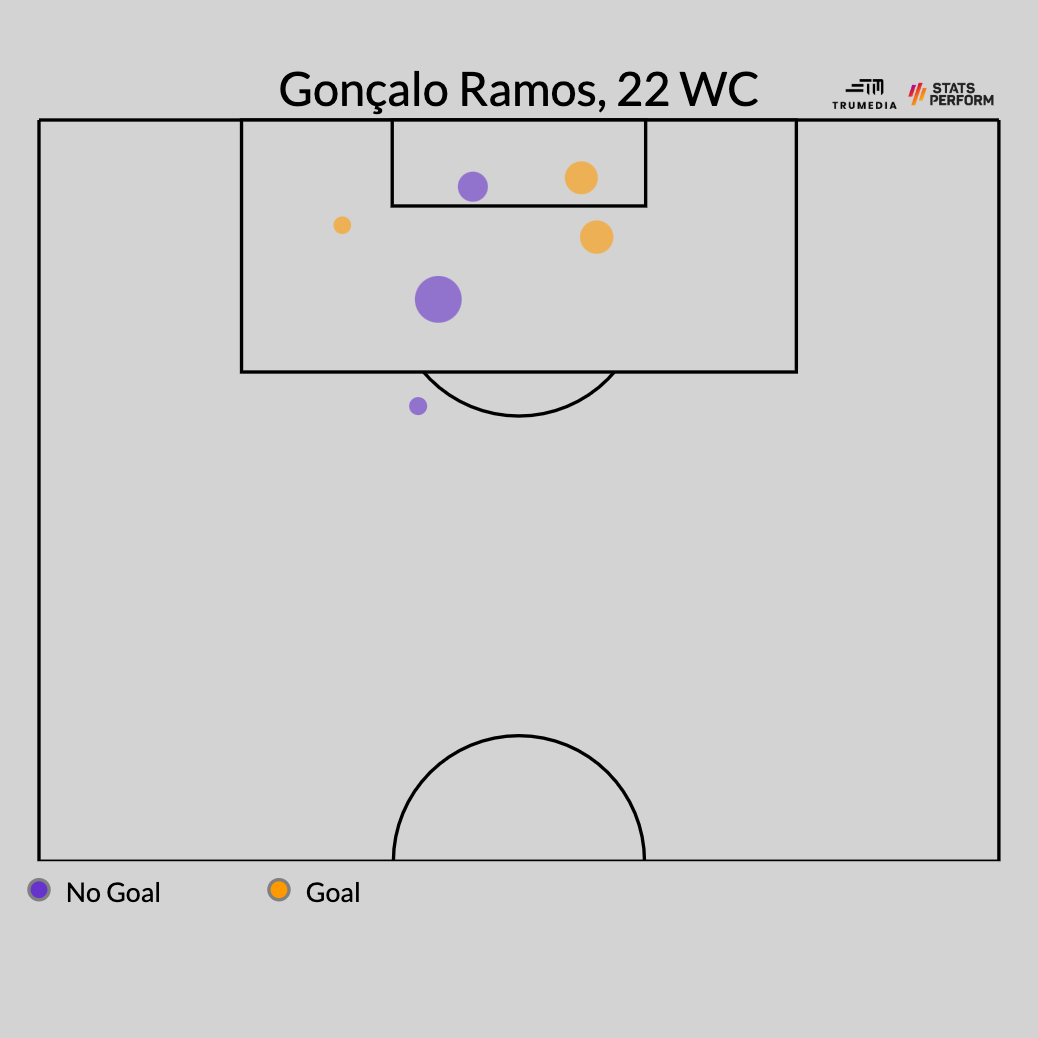My favorite thing about the 2022 World Cup so far? The stars are bringing it.
Think of the highest-profile players whose supposed legacies had the most riding on the outcome of this tournament. Lionel Messi is probably having the best World Cup of his career at age 35. Kylian Mbappe has been even better. And Neymar, even after suffering a serious-looking ankle injury, is back at the forefront for a Brazil team that has done nothing but reemphasize its status as tournament favorites with each passing match.
The 20-year-old Pedri was brilliant despite Spain‘s flameout, and the same goes for 19-year-old Jamal Musiala, who was one of the three or four best players at the tournament through the group stage, even though Germany went home after the group stage. Outside of the disaster that is Belgium, which was only a disaster if you abide by the FIFA rankings, and the marginalization of Cristiano Ronaldo, which should’ve happened months — if not years — ago, there aren’t any stars who suddenly have “can’t hack it on the big stage” suddenly hovering over them.
Netherlands center back Virgil van Dijk has been great in his first World Cup, Croatia center midfielder Luka Modric has been great in what seems like his 15th World Cup, and all of Portugal‘s younger stars — including Bruno Fernandes and Bernardo Silva — have been flourishing, too.
Of course, the games that people really remember — the ones we’ll be talking about in 20 years — are just getting started. Everything I just said could suddenly change, or we could keep moving along the same track of high-performance everywhere. Either way, knockout-round matches between teams of progressively equivalent talent tend to be decided by minor stylistic advantages, moments of brilliance, flashes of disaster, or all of the above.
Ahead of the quarterfinals Friday and Saturday, here are the eight players who could have an outsize influence on whether or not their team makes it to the semifinals.
 Brazil: Casemiro
Brazil: Casemiro
There’s really only one area of the field where Croatia can feel like they’ve got an advantage over the Brazilians: midfield. With Inter Milan’s Marcelo Brozovic, Chelsea‘s Mateo Kovacic and Real Madrid‘s Luka Modric, the Croatians have the most talented and most cohesive midfield left in the tournament. They’re massive underdogs, too — by far the biggest of the quarters with a 23% chance of advancing, per FiveThirtyEight. If they’re to overcome those odds, the most likely path comes from pressing that advantage in midfield as many times as possible.
The man who can prevent that from happening: Manchester United‘s Casemiro.
Brazil play with something of a bifurcated team: some players attack, while others defend. You’ll almost never see that at the club level these days, but it still can work at the international level if you have Brazil’s talent and a guy like Casemiro occupying the hinterland between both zones.
Through four matches, Casemiro leads Brazil with 20 completed progressive passes, which FBref defines as “completed passes that move the ball towards the opponent’s goal at least 10 yards from its furthest point in the last six passes, or any completed pass into the penalty area. Excludes passes from the defending 40% of the pitch.” He also leads or co-leads the Brazilians in tackles attempted, interceptions, and blocks.
If he’s doing his thing Friday — breaking up possessions and moving the ball forward — it’s going to be a long day for Croatia.
 Croatia: Josko Gvardiol
Croatia: Josko Gvardiol
Here’s the thing about Croatia — well, two things. First, they don’t win games. In fact, they haven’t won a knockout match at the World Cup in 90 minutes since 1998. Second, they’re old. Per FBref, they’re by far the oldest team left in the tournament, with an average age (weighted by minutes played) of 29.4.
What happens when you combine both of those things? Well, you get a team of old dudes who haven’t been able to rest at any point. Croatia didn’t clinch qualification until the final whistle blew against Belgium, and then their match with Japan went the full 120.
There’s almost no way that any of Croatia’s stars are going to be operating at full tilt against Brazil — other than maybe Gvardiol. The RB Leipzig center back is one of the most sought-after prospects in Europe, and he has played every minute for Croatia. Also, he’s only 20.
Brazil are the best team left in the tournament; they’re arguably the best team on both sides of the ball, too. If Croatia are going to win — and if they’re going to fend off enough Brazilian attacks to let that midfield do enough damage for it to matter — Gvardiol, who’s leading the team in clearances with 25 and in total progressive passing distance, probably needs to have one of the games of his life.
 Argentina: Enzo Fernandez
Argentina: Enzo Fernandez
Against the Netherlands, it’s all going to come down to the tempo-setting in midfi–
 Argentina: Lionel Messi
Argentina: Lionel Messi
Just kidding. C’mon. Messi leads Argentina in the following stats:
- Goals
- Shots
- Chances created
- Expected assists
- Progressive passes
- Passes into the penalty area
- Passes into the final-third
- Switches of play
- Shot-creating actions
- Attacking-third touches
- Penalty area touches
Oh, and he’s tied with Angel Di Maria for completed passes and progressive passes received.
That last point seems particularly relevant for the match against the Netherlands. You’re not going to stop Messi from affecting the game; the only way to do that is to swarm him with multiple players at all times, which would itself massively affect the game by creating a ton of space for everyone else. But the bellwether for the Albiceleste is where Messi is receiving the ball.
When Argentina are at their best, he’s receiving passes upfield and affecting play around the penalty area. When they’re at their worst, Messi has to drop deep and be the one to play the passes upfield himself.

Despite the win, the Mexico match was Argentina’s worst performance of the tournament. Messi received just two progressive passes against El Tri. In their best match, against Poland? He received seven.
 Netherlands: Memphis Depay
Netherlands: Memphis Depay
On-off stats don’t really work in soccer like they do in basketball because there are so few subs and, more broadly, so few games. Bringing this kind of analysis to the World Cup — where there are barely any games, and the competition level varies massively from game to game — isn’t just completely useless; it might be outright destructive. It would lead you to thinking that, say, Antonee Robinson is the worst American soccer player of all time, or that Achraf Hakimi needs to ride the bench for Morocco.
However! This is one of the very few times I think these numbers provide something useful.
Overall, the Dutch just haven’t been very good. They were excellent in a couple individual moments against the USMNT, but there were enough chances on either end that the scoreline could’ve ended very differently.

Through four games, the Netherlands have a slightly negative expected-goal differential, which essentially just represents the difference between the quality of chances you create and concede. More simply, they’ve attempted nine shots per match and conceded 13. Given a relatively weak schedule of opponents, this is not the profile of a good team. However, Memphis has started only two of the four matches and featured in only about 60% of the minutes. The xG differential per 90 minutes for the Netherlands is nearly half a goal (plus-0.41) better when he has been on the field, compared to off of it.
Despite his somewhat limited minutes, Memphis leads the Netherlands in shots attempted, progressive passes received, and touches inside the penalty area. That’ll need to continue Friday. Argentina have conceded only an absurd four shots per game, so attempts and perhaps simply just attacks — the Argentines have held 65% possession, too — will likely be at a premium.
 Morocco: Achraf Hakimi
Morocco: Achraf Hakimi
What do you want from your full-back? Are you more of a traditionalist, “defenders should defend” type? Well, the PSG full-back leads all players at the World Cup with 23 tackles+interceptions combined.
Perhaps you prefer more of a passer? Someone who can dictate the game from awkward near-the-sideline positions that create gaps in the defense? Hakimi is second on the team in progressive passes and has played more passes into the final-third and then penalty area than anyone else.
OK, fine. Maybe you want more of an attacker? A runner who’s going to crash forward and create havoc in and around the box? Well, he’s tied for the team lead in expected assists and touches inside the penalty area, and he’s third in progressive passes received.
Hakimi is a superstar on a typically middling national team, but he plays a position where it’s theoretically harder to influence the game than in the middle of the field or up top. If you were, say, the 16th-best national team in the world, and you were allowed to pick one position to have one world-class player at, full-back might be the last position you’d pick. However, Hakimi has been at the forefront of Morocco’s incredible defense — zero goals scored by opponents through four matches and extra time — and he has also been involved in just about every dangerous Moroccan attack, too.
He’s easily been one of the players of the tournament.
 Portugal: Goncalo Ramos
Portugal: Goncalo Ramos
I don’t really think we can undersell what a revelation this dude was after being named a surprise starter for the Switzerland match.
Despite playing only 84 total minutes in the tournament, the 21-year-old is leading Portugal in not just total goals scored, but in total non-penalty xG. He didn’t just pick out the top corner every time, either; he gathered a massive collection of high-quality opportunities. In fact, it’s even a little more extreme than that. Ramos is tied for 10th in npxG among all players at the whole World Cup.

I’d wondered a bunch through the group stages what Portugal might look like with a more dynamic, mobile center-forward paired with all their younger, dynamic playmakers. Earlier in the tournament, manager Fernando Santos hinted at this idea, saying he wanted “variability” from a “hybrid system.” But that would never be realized with the relatively limited and ineffective Cristiano Ronaldo starting up top.
With Ramos out there, the team looked different beyond all of the goals and assists he added, and the approach was certainly aided by him smashing one into the roof of the net 17 minutes in. That meant Switzerland had to push more bodies forward, and suddenly there was all kinds of space for these dynamite talents to run into. From there, the game turned into a rout.
There likely won’t be much space against Morocco’s defensive approach, but if the presence of Ramos still allows them to make easy work of a team that — again — hasn’t conceded a goal from an opponent yet, then Portugal are a serious title-contender.
 France: Ousmane Dembele
France: Ousmane Dembele
Mbappe has been the best player at the World Cup, and he’s probably — over the long run of a full season — the best player in the world. You don’t need to understand soccer to know this, either. If you’ve watched France play once at the World Cup, you can tell that he’s just different from everyone else. He’s leading all players at the tournament in goals, shots, non-penalty xG, shot-creating actions (the two actions that occur before a shot), goal-creating actions, progressive passes received, and touches inside the penalty area. Trying to stop Mbappe is like trying to catch a comet.
Of course, England know this already, and this game is projected to be much closer than any of the other four quarterfinals. If Mbappe goes off, England won’t win. If Mbappe doesn’t go off, England stand a real chance — unless Ousmane Dembele has something to say about it.
On the other wing from Mbappe, France have perhaps the most two-footed and best ball-progressing winger on the planet. At times, it seriously feels impossible that anyone could ever stop him given his ability to control the ball with both feet and how it allows him to cut in, drive to the end line or beat multiple defenders in the same run by heading in completely opposite directions. While Mbappe does most of his damage before he gets the ball, Dembele leads France in passes completed into the area and crosses completed into the box.
Now, he hasn’t been quite the creative force for Les Bleus that he has been for Barcelona — he’s fourth on the team in expected assists — but the potential for Dembele to take over the game, as all the English attention swings toward Mbappe, certainly exists. And if it gets realized on Saturday, England don’t really stand a chance.
 England: Jude Bellingham
England: Jude Bellingham
Yeah, yeah, Kyle Walker is going to try to shut down Mbappe on the right flank and he has, at times, done it successfully for Manchester City when they’ve played Paris Saint-Germain in the Champions League. Even at his advanced age, Walker — if he’s healthy — is one of the few athletes who has a shot at containing the French superstar. But if that works out — and especially if it doesn’t — England are going to need to score a goal or two.
Now, there’s a chance that France benches Dembele and reverts to a more defensive lineup, in which case Dembele would still be an X factor as his absence would still have a massive effect on the outcome of the match. But the story for France at this tournament is that they’ve played a much more open style than we’ve seen in the past. They’ve paid for it on the defensive end, allowing a goal per game — more than everyone left, outside of Portugal — but overall, I think it’s been the right trade-off. Despite playing a match against Tunisia with their B-team, France currently have the third-best xG differential (plus-5.39), after Argentina and then Brazil.
The interesting thing, though, is that they’re basically just playing more attackers, and that’s made them more attacking. Otherwise, they’re playing roughly the same way they’ve always played when they lose the ball, which is to say: extremely passive, most of the time.
France are allowing opponents to complete 83% of their passes — second-highest among quarterfinalists after Morocco — and they’re allowing 16.64 opponent passes per defensive action (PPDA), which is also second-highest after Morocco. They will occasionally fight to win back possession, but most of the time the forwards just sort of drop behind the ball and then seemingly allow the other team to play the ball forward into their defensive half.
Enter: Jude Bellingham.
The 19-year-old already was one of the best midfielders in the world, but the World Cup has confirmed it. He’s not a traditional midfielder in the sense that he won’t dominate a game with his passing. He has played 11 progressive passes — tied for sixth-most on the team. Rather, he takes over either without the ball or by carrying it himself. He’s leading England in combined tackles+interceptions and progressive passes received. But he has also completed more dribbles than anyone on the team and he’s the co-leader in shot-creating actions.
In other words, he can — and does — do it all. On Saturday, there’s going to be plenty of space for him to show it off, too.
Credit: Source link